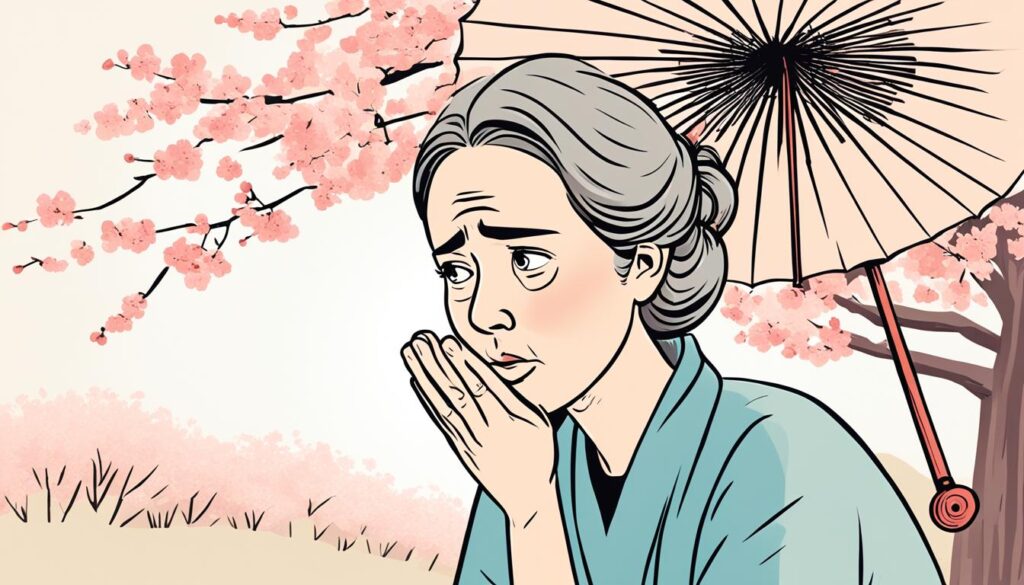When communicating with someone in a foreign language, it is essential to know how to express concern for their well-being. In Japanese, there are various ways to ask if someone is okay, depending on the level of formality and the specific situation. This article will guide you through different phrases and expressions to inquire about someone’s well-being in Japanese.
Meaning and Grammar
The most natural and standard phrase for asking “Are you okay?” in Japanese is “大丈夫ですか?” (daijōbu desu ka?). The word “大丈夫” (daijōbu) means “okay” or “fine,” and the addition of “ですか?” (desu ka?) turns it into a question. This phrase can be used in various situations, including with strangers and people you don’t know well.
How to Pronounce and Equivalent Words
The pronunciation of “大丈夫ですか?” (daijōbu desu ka?) is “dai-joh-boo des-ka.” It is important to note that the “u” sound in “大” (dai) and “丈” (jō) is slightly muted, giving it a softer pronunciation.
Equivalent words or phrases in English for “Are you okay?” include “How are you?” or “Is everything alright?” However, it is important to remember that direct equivalents may not always exist in other languages, so understanding the cultural and contextual usage of Japanese phrases is crucial.
Writing in Kanji
The phrase “Are you okay?” in Japanese, written in kanji, is “大丈夫ですか?” (大丈夫ですか?). The kanji characters for “大丈夫” represent the meaning of being “okay” or “fine.” However, it is more common to write it in hiragana or katakana for general communication.
Contextual and Cultural Usage of the Word
Asking if someone is okay in Japanese is a way to show concern and care for their well-being. It is important to note that the level of formality and the specific situation will determine the appropriate phrase to use.
The phrase “大丈夫ですか?” (daijōbu desu ka?) is a neutral and commonly used expression that can be used with strangers, acquaintances, or people you don’t know well. It is a safe and respectful way to inquire about someone’s well-being in most situations.
On the other hand, the phrase “大丈夫?” (daijōbu?) with a raising intonation is a more casual way to ask if someone is okay. This expression is commonly used with friends, children, and co-workers in informal settings.
Examples in Sentences
- 大丈夫ですか?(daijōbu desu ka?) – Are you okay?
- 大丈夫でしたか?(daijōbu deshita ka?) – Were you okay?
- 大丈夫?(daijōbu?) – Are you alright?
- 元気ですか?(genki desu ka?) – Are you feeling well?
- 調子はどうですか?(chōshi wa dō desu ka?) – How are you doing?
Remember, when someone shares their well-being with you, it is essential to respond politely. A common response in Japanese is “どういたしまして。” (dō itashimashite), which is equivalent to saying “You’re welcome” in English.
“大丈夫ですか?” (daijōbu desu ka?)
The phrase “大丈夫ですか?” (daijōbu desu ka?) is the most natural and standard way to ask if someone is okay in Japanese. “大丈夫” (daijōbu) means “okay,” and the addition of “ですか?” (desu ka?) turns it into a question.
This phrase has a neutral nuance and can be used in various situations, including with strangers and people you don’t know well. It is a safe and commonly used expression to check on someone’s well-being.
In Japanese culture, expressing concern for others is considered polite and shows compassion. By asking “大丈夫ですか?” (daijōbu desu ka?), you are showing that you care about the other person’s welfare.
Here is an example of how to use this phrase:
Person A: ごめんなさい、手こずっています。 (Gomen nasai, tekosutte imasu.)
Person B: 大丈夫ですか?お手伝いしましょうか? (Daijōbu desu ka? Otetsudai shimashō ka?)
Translation:
Person A: “I’m sorry, I’m having some trouble.”
Person B: “Are you okay? Can I help you?”
By asking “大丈夫ですか?” (daijōbu desu ka?), you are opening the door for the other person to express any difficulties or concerns they may have, allowing you to offer assistance or provide support.
| Japanese Expression | Meaning |
|---|---|
| “大丈夫ですか?” (daijōbu desu ka?) | The standard and most natural way to ask if someone is okay. |
| “大丈夫?” (daijōbu?) | A casual way to ask if someone is okay, commonly used with friends and co-workers. |
| “大丈夫ですか?” (daijōbu desu ka?) | A polite way to inquire about someone’s well-being, suitable for formal situations. |
| “だいじょうぶですか?” (daijōbu desu ka?) | An informal version of “大丈夫ですか?” (daijōbu desu ka?) with a similar meaning, commonly used in conversations. |
These expressions provide different levels of formality and can be used according to the relationship with the person and the context of the conversation.
“大丈夫?” (daijōbu?)
Another way to ask if someone is okay in Japanese is by saying “大丈夫?” (daijōbu?) with a raising intonation. This is a casual expression and is commonly used with friends, children, and co-workers. It has a less formal nuance compared to “大丈夫ですか?” (daijōbu desu ka?) and is generally not used with people who have a higher social status or with individuals you don’t know well. It’s a more relaxed way to check on someone’s well-being.
“大丈夫ですか?” (daijōbu desu ka?)

When you want to ask someone in a polite manner if they are okay, you can use the phrase “大丈夫ですか?” (daijōbu desu ka?). This is a formal way to inquire about someone’s well-being and is appropriate for more formal situations or when speaking to someone of higher social status. By using this phrase, you show respect and politeness in the conversation.
In Japanese culture, politeness is highly valued, and it is important to choose the appropriate expressions based on the context and the person you are speaking to. The phrase “大丈夫ですか?” conveys your concern for the other person’s well-being and shows that you care about their safety and comfort. It can be used in various situations, such as checking on a coworker or asking a stranger if they need any assistance.
Using polite language is particularly important when interacting with individuals who are older, have a higher social status, or whom you are not familiar with. By using the phrase “大丈夫ですか?” (daijōbu desu ka?), you demonstrate your respect and consideration towards the other person.
If you are unsure about the level of formality required in a particular situation, it is generally safe to use this polite expression. However, keep in mind that the level of formality may vary depending on regional customs and personal relationships.
When someone responds to your inquiry, it is important to listen attentively and respond accordingly. A common response to “大丈夫ですか?” is “はい、大丈夫です。” (hai, daijōbu desu), which means “Yes, I’m okay” or “はい、おかげさまで大丈夫です。” (hai, okagesama de daijōbu desu), which means “Yes, thanks to you, I’m okay.” Remember to show appreciation and acknowledge their response with phrases like “どういたしまして。” (dō itashimashite) or “どういたしまして、お気をつけてください。” (dō itashimashite, oki o tsukete kudasai), which can be translated as “You’re welcome” or “You’re welcome, please take care.”
Using polite expressions in Japanese not only shows respect, but it also helps to create a positive and harmonious atmosphere in your interactions. By asking “大丈夫ですか?” (daijōbu desu ka?), you can effectively convey your concern for the well-being of others in a polite and culturally appropriate manner.
“だいじょうぶですか?” (daijōbu desu ka?)
In addition to the standard phrase “大丈夫ですか?” (daijōbu desu ka?), there is a more informal version, “だいじょうぶですか?” (daijōbu desu ka?), which has the same meaning. This casual expression is commonly used in conversations and can be used with friends, acquaintances, and peers. However, it is less formal and may not be suitable for more formal or polite situations.
If you want to inquire about someone’s well-being in a more relaxed and informal way, you can use “だいじょうぶですか?” (daijōbu desu ka?). This phrase is often used in everyday conversations and shows a friendly concern for the other person’s welfare. It’s a great expression to use with friends, colleagues, or anyone you feel comfortable with.
Keep in mind that the level of formality in Japanese is important, and using the appropriate expression based on the situation and the person you are talking to is essential. Using “だいじょうぶですか?” (daijōbu desu ka?) is a more relaxed and informal way to ask someone if they are okay, but be mindful of the context and choose the right expression accordingly.
“どういたしまして。”
After asking someone if they are okay in Japanese, a polite way to respond to their answer is by saying “どういたしまして。” (dō itashimashite) or “どういたしまして、お気をつけてください。” (dō itashimashite, oki o tsukete kudasai). These phrases are equivalent to saying “You’re welcome” in English and show politeness and gratitude for the conversation. It is important to respond politely and respectfully when someone shares their well-being with you.
| English Phrase | Japanese Phrase |
|---|---|
| You’re welcome. | どういたしまして。 |
| You’re welcome. Take care. | どういたしまして、お気をつけてください。 |
Additional Japanese Phrases for Inquiring About Well-being
In addition to the standard phrases for asking if someone is okay in Japanese, there are various other expressions you can use to show your concern for someone’s well-being. These phrases can help you convey your empathy and support in different situations.
One common expression is “お大事に” (o-daiji ni), which literally translates to “Take care of yourself.” This phrase is often used when someone is feeling unwell or recovering from an illness or injury. By saying “お大事に,” you are showing your empathy and wishing them a speedy recovery.
Another phrase you can use is “お元気ですか?” (o-genki desu ka?), which means “Are you doing well?” This expression is a more general way to ask about someone’s overall well-being. It can be used as a greeting or to check on someone’s physical and emotional state.
Lastly, you can use the phrase “心配しています” (shinpai shite imasu), which translates to “I’m worried.” This expression shows a genuine concern for someone’s well-being and conveys that you care about their current situation. It is a heartfelt way to express your support and willingness to help if needed.

